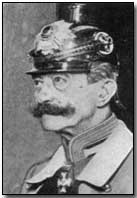Primary Documents - Governor Ferdinand von Bissing on Germany's Policy of Deporting Belgians to Germany, 23 November 1916
 Reproduced below is the
text of a letter sent by the German Military Governor in occupied Belgium,
Ferdinand von Bissing, in reply to one by the Roman Catholic Archbishop of
Malines, Cardinal Desire
Mercier.
Reproduced below is the
text of a letter sent by the German Military Governor in occupied Belgium,
Ferdinand von Bissing, in reply to one by the Roman Catholic Archbishop of
Malines, Cardinal Desire
Mercier.
Cardinal Mercier had made repeated demands that Germany's policy of deporting unemployed Belgian citizens to Germany - where they were essentially used as forced labour - cease immediately. (Click here to read one of Cardinal Mercier's public statements on the subject.)
In his reply, dated 23 November 1916, Governor von Bissing stated that the German policy would continue and that, ultimately, it benefited the Belgium economy for unemployed men to be used in this manner.
Click here to read Cardinal Mercier's reply to this letter.
Governor von Bissing on Germany's Policy of Deporting Unemployed Belgians to Germany
Brussels, November 23, 1916
Most Honoured Cardinal:
I acknowledge receipt of your honoured letter, dated November 10th, and of the manuscript letter dated November 15th, concerning the delay in delivery.
This is the answer which I have to give.
Your Eminence wrote to me on October 19th last requesting that the utilization of Belgian unemployed in Germany should come to an end. In my answer dated October 28th, I have, in spite of my appreciation of your point of view in the matter, indicated the reasons and the ideas which have inspired the decisions of the occupying power with relation to the question of labour.
These decisions were not arbitrarily or hastily taken without sufficient consideration for the difficulties of the problem; they were the outcome of ripe reflection bearing on the circumstances and the necessity recognized as unavoidable.
The extensive unemployment which prevails in Belgium is a great social evil and the employment of idle Belgians in Germany brings them great benefit. I said to your Eminence, on my arrival in Belgium, that I wanted to heal the wounds inflicted by the war upon the Belgian people; the recent measures are not in the least in contradiction with this declaration.
I must also consider as a misrepresentation of facts the way your Eminence sets aside the many and often successful efforts which I have made to revive Belgium's economic life with the remark that, on the contrary, unemployment has been artificially created.
Regarding the importation of raw materials into Belgium and the exportation of manufactured articles, England has made unacceptable conditions. There were some time ago negotiations between neutral and Belgian organizations on this question; to dwell on them would lead me too far.
I can only repeat here that the present regrettable circumstances are the result, fundamentally, of England's policy of isolation, just as the seizure by us of all raw material was only, after all, a forced consequence of the same policy.
I must also firmly maintain that the occupation affords the country, from the economic point of view, all the advantages which can be provided, considering the conditions enforced on us by England.
In the execution of the measures taken concerning the unemployed, my administration has met with a series of difficulties which cause some inconvenience to the population. All this might have been avoided if the communal authorities had made their execution more simple and more effective by their attitude toward them. Under the present circumstances, we are obliged to use a more involved procedure, into which a wider circle of people are necessarily drawn.
Measures, however, have been taken in order to avoid mistakes as much as possible. Some definite classes of professions have been exempted beforehand from submitting to control, and the individual claims, if they are well founded, will be either immediately considered or submitted to further examination.
Your Eminence will understand from what is stated above that it is impossible to comply with the desire concerning the stoppage of the measures which have been adopted, and that, in spite of the difficulties which we have met, their execution is pursued in the interest of all.
Source: Source Records of the Great War, Vol. IV, ed. Charles F. Horne, National Alumni 1923
The German word "U-Boat" was derived from "Unterseeboot" (undersea boat).
- Did you know?
